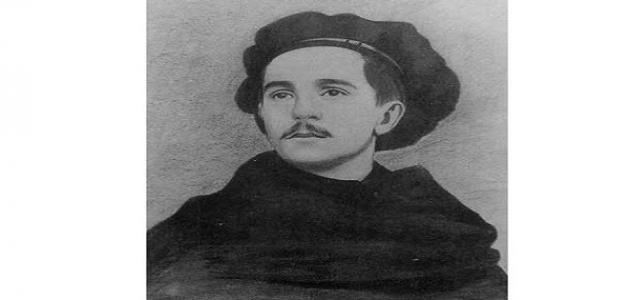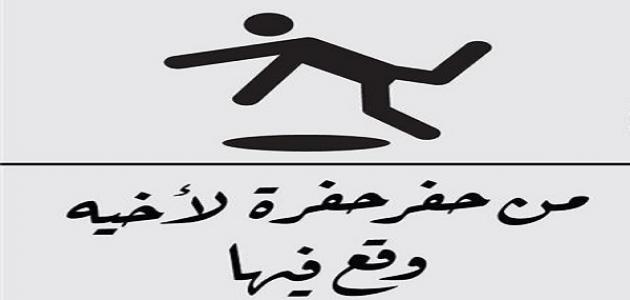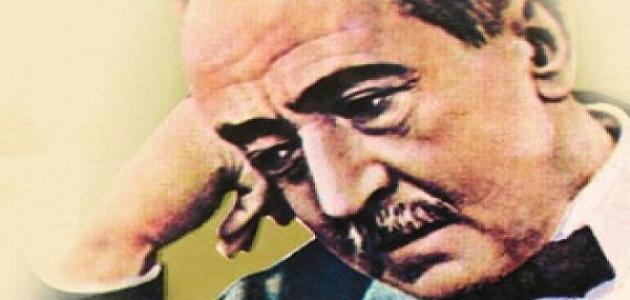Ahmad Shawqi
This poem was composed by the Egyptian prince of poets Ahmed Shawky, who is considered one of the most famous poets of the modern era, as he contributed to the cultural and literary renaissance. And vitality, Shawqi was inspired by the unique instinct in composing poetry with ease and ease, and most of his poems were directed to his Arab and Islamic nation.
Analysis of the poem Nahj al-Burda
The following is an analysis of the limitations of Nahj al-Burda based on the main ideas contained therein:
Verses (1-2)
Shawqi began his poem Nahj al-Burda, influenced by the poets Kaab bin Zuhair and Al-Busiri, so he started his poem with flirting as the poets before him used to. Shawqi likened the beloved beauty to the beauty of the antelope standing among the trees of the picturesque green forest, but the sight of the antelope attracted and dazzled Shawqi more than the beauty of the forest, until he likened Shawqi The intensity of the antelope’s beauty with the cutting sword that killed him despite the sanctity of bloodshed in the sacred months (Dhu al-Qa’dah, Dhu al-Hijjah, Muharram, and Rajab) in Islam, as Shawqi indicated that the lion, who lies in his dwelling despite his strength and might, could not bear to look at this two-eyed antelope The two beauties, as if he was seeking the help of others because of the beauty of this antelope.
Read also:Dialogue between television and radioVerses (3-4)
Shawky described his feeling towards this antelope when looking at it with a fixed gaze, as Shawqi felt that the arrows of love had hit his heart and reached his small liver, which no doctor could treat. Shawky explained the extent of the pain that this antelope caused him, but he could not reveal this pain to anyone. The agony of this love, believing that this love will not affect him psychologically or mentally.
Verses (5-7)
Shawqi showed the qualities that every lover should possess, which are forgiveness and good manners, and he also singled out seeking excuses for people, and this characteristic is known from the purebred Arabs, and Shawqi asked that no one blame him for falling in love, and if those who blame him had lived the same experience, they would not have reprimanded him or reprimanded him. Shawky asked Lameh, Do you think I hear you when you speak or blame? It is true that I offer a listening ear to you, but my heart is preoccupied with the love and anguish that has befallen it since seeing that antelope and he is referring to the girl.
Verses (8-10)
Shawqi praised the beauty of his beloved's limb and described it as a tooth, and prayed to God for her not to taste the taste of love, so that she would not be tormented and suffocated by the taste of love as it happened to him, and he prayed for her eyes to sleep well and soundly, as Shawqi returned to confirm his love for his beloved who did not reciprocate him, so he gave her everything What he could of compassion, mercy and tenderness, and she met him with a lack of feelings, and my longing used linguistic antonyms to express his feelings towards his beloved, and the contradictory feelings between them, and he wished to reach her as the lover reaches his beloved, even if in his dreams.
Read also:Phrases of Nizar QabbaniVerses (11-13)
Shawky likened a woman's body to a long, swaying dairy branch that sways a man's heart, and the number of types of women and their ingenuity, some of whom play with a man's heart until they cause him to be injured. Shawky confirmed that the movement of women's eyelids may cause death to some men, because of its effect on the souls of lovers.
Verses (14-19)
Shawqi portrayed the beauty of the gait of these slender women, including the confidence, dignity, and prestige that each of them stepped on the hearts of men without realizing, and they might set fire in their hearts and livers when they laughed with shyness and shyness. Regardless of the type, shape, and color of beauty, it is, in the end, an integrated, harmonious, and absolute beauty. Their beauty and beauty are only those who know and taste the taste of beauty, and in the end my longing surrendered and affirmed his weakness and submission to this beauty that dominated his body, his soul, and his heart until he made his body a rug for this beautiful woman to walk and gorge on him as she wanted, wandering in his bowels, climbing its heights, descending in its valleys, messing around. And play with it as you like.
Read also:words about friendshipVerses (20-22)
Here, Shawky mentioned that the beautiful woman with whom he fell in love is the daughter of a great man, which increased his fear and panic, so his wish and desire were limited to one place, which is her father's palace. Shawky became wondering when and where he would meet her, in the bright light of the day or in the dark night? In the woods or in her father's palace? And he continues in amazement at how he emerges from the back of this stallion, this tender, mellow flower, and how he emerges and grows from this predatory lion, this soft deer.
Verses (23-24)
Shawky wondered again how he would communicate with his beloved, and how he would overcome obstacles. Her father is a great man with only authority and prestige, and the second obstacle is her chastity and purity, which prevent her from reaching the beloved, so Shawqi was sure that he would not reach his beloved except in his dreams, as she is far from him as far as the city of Iram, which was mentioned in the Holy Qur’an.
Verses (25-30)
Shawky tried to convince himself not to trust the temptations and joys of the world, as we do not know what was written in the unseen of destiny and sadness, and he likened the world to the spotted snake, i.e. dotted with black and white, its color is beautiful, but it carries poison in its mouth, and Shawky continued that the poison that comes out of the mouth of the snake, is like a fake smile What we see is one of the temptations of the world, and my longing for the world is likened to a woman, as she is wanted since the inception of creation, and everyone seeks to obtain her and acquire from her, as she is tempting and exciting to people, so they compete for her as men race to propose to a beautiful woman whose husband does not die and never leave her, but the world continues to carry worries And tragedies from the beginning of time, such as the story of our master Adam and his grief over the loss of his son, and this will happen to people until the end of the universe. And they dream and strive all their lives to fulfill their aspirations, then calamities suddenly overtake them while they do not realize.
Verses (31-38)
My longing continued, explaining an eternal truth in this world, which is that as much as it gives joy and grace, it must guide grief and pain, sometimes for you and sometimes against you, and my longing emphasized that this world deceives people and manipulates the truth and leads them to follow their pleasures, so people become walking in the world without wisdom or Insightful, they commit sins while they are unaware of the reality of perdition, and they blacken their pages in sins, sins, and the pleasures of life, and they forget to provide themselves with obedience, so they become prey to pleasures, wandering with amusement and play, then Shawqi explained that getting rid of this situation comes by correcting and reforming morals, as it is the way to protect the soul from slipping In these slips, then Shawky stressed that the reward is of the kind of work, for the good soul that takes righteousness as a way will reap goodness and wellness in exchange for what it sowed, while the bad soul that takes evil as a way will reap bad sowing, and Shawky stressed the importance of self-control, monitoring and holding it accountable constantly , so as not to drown in pleasures, and resemble that the one who controls himself, like a horse that controls the reins.
Verses (39-41)
Here Shawqi prayed to God Almighty, pleading with His Messenger, peace be upon him, saying: If you have committed grave sins that God Almighty will not forgive on the Day of Resurrection, the day when no one will be saved except those by God’s mercy and infallibility, then I implore the owner of the greatest intercession, the Messenger of God, may God’s prayers and peace be upon him, who is singled out for By interceding for us on the Day of Resurrection without the rest of the prophets, and describing the Prophet, peace be upon him, as a reliever of distress and worries in this world and the hereafter, and this is the first verse in the poem of Al-Burdah that Shawqi began with by venerating the Messenger, peace be upon him.
Verses (42-44)
Usually, pious believers offer good deeds to be intercessors for them on the Day of Resurrection. As for Shawqi, he will pour tears of repentance and remorse in the hands of the Messenger of God, peace be upon him, for the sins and misdeeds he committed. He is the best intercessor in this world and the Hereafter. Because whoever clings to them will never go astray, for it is the best salvation for the right path, and whoever applies the teachings of religion inspired by the approach of the Noble Qur’an and the noble Sunnah, then he will gain spoils and win on the Day of Resurrection by meeting the beloved Chosen One and obtaining his intercession.
Verses (45-48)
Shawqi wanted to praise the Messenger, peace be upon him, so that he would have a treasure and a good deed that would intercede for him on the Day of Resurrection when he met God Almighty and His greatest Messenger. He also wanted to build a strong connection between him and the Messenger, peace be upon him, when he praised and glorified him in this poem. Shawqi refers to the poem that was composed by the poet Zuhair bin When Abi Salama praised Haram bin Sinan and exaggerated it with praise, that it is not equal to or measured by the poem that Shawqi composed in praising the Messenger, peace be upon him, and Shawqi returned to praising the Messenger of God, hoping for the intercession of the Messenger of God on the Day of Resurrection, and he likened the intercession of the Messenger of God to a basin of water that quenches thirst when All people flock to this basin, asking for mercy and forgiveness in the severity of this situation.
Verses (49-52)
Shawqi likened the light of the Messenger, peace be upon him, and his guidance to the light of the sun that illuminates everything around him, and considered the Messenger, peace be upon him, to be higher in rank and status than the stars and the orbiting sphere in his galaxy. Shawky likened the light of the stars that emanates from them to the light and brightness that emanates from the Messenger, peace be upon him, and Shawky explained that the branch usually grows from the root, but unusually here the root grew from the branch when he likened the height of the planets and the brightness of the stars to the height and position of the Messenger, peace be upon him.
Verses (53-58)
Shawqi mentioned how the monk Buhaira recognized the signs of the Prophet’s prophecy, peace be upon him, at an early age through the characteristics and qualities that appeared to the Messenger of God during his work in trade between Mecca and the Levant, although recognizing the signs of prophecy at that time was impossible, unless someone asked the cave wall and landing The revelation by which the Messenger of God was worshiped, so he is the eyewitness to the revelation of the prophecy, or if someone asked Gabriel, peace be upon him, about the matter of prophecy, and this is an impossible matter that will not happen, then he expels my longing, speaking about the path or the path that the Messenger, peace be upon him, honored him by taking when the Messenger of God was walking back. Returning from his house to the Cave of Hira in the morning and evening to worship all the time, and this seclusion between him and God Almighty was better, dearer, and more desirable to him than mixing with people and family, so he used to converse with his Lord and seek goodness for all, so how not? He is the owner of the general virtue, and Shawqi mentioned one of the miracles of the Prophet, peace be upon him, and the evidence of his prophethood, when he hit the ground with his palm, and water overflowed from it, and he watered the companions and animals until they were hydrated.
Verses (59-61)
My longing went on about the miracles of the Messenger, peace be upon him, mentioning the incident of the cloud in which rain and goodness gathered when it covered and shaded the Messenger, peace be upon him, when he was heading with trade towards the Levant, and continued my longing in describing this incident, saying that the Christian monk Bahira worshiped in his monastery, and the sober people felt the blessings of the Messenger upon him Peace and its sects, and they expected the appearance of the last of the prophets.
Verses (62-68)
Shawqi referred here to the mission of the Messenger of God and the descent of the revelation, Gabriel, peace be upon him, by order of God Almighty, asking him to recite, so the word “read” was the first word between him and God Almighty directly that no one connected with, and he completes my longing in describing the Messenger, peace be upon him, when he went out to Makkah proclaiming Islam and monotheism His call resounded in the ears of the people of Makkah, then Shawqi explains how the people of Makkah received the news of this call from a man they had called him the Truthful and Trustworthy, and they are now between believing and denying this news. And the prophets, and God Almighty granted him and distinguished him from the rest of his creation in good manners and form.
Verses (69-74)
My longing completed the comparison between the Messenger, peace be upon him, and the rest of the prophets, and how God favored him without the rest of the messengers with miracles and evidence that remained preserved until the Day of Judgment, such as the miracle of the Noble Qur’an, the book that God pledged to preserve until the Day of Judgment, and its rulings and laws are valid for every time and place, as for the rest of the messengers, their miracles ended due to distortion Humans have it, and Shawqi continues his praise of the Messenger, peace be upon him, describing his eloquence in the Arabic language, although he was illiterate and did not know how to read and write, but his miracle was competing with the poets of his people at the time, and his words were sweet and fell in the ears of the listeners like precious pearls, adding to it a new taste and color, and reviving the companions with it. Dead hearts, and rekindle their passions.
Verses (75-79)
Shawqi spoke here about the birth of the Messenger of God, and how the world changed with his advent, so that his lights spread to the east and west, and shook the entity of tyrants from among the kings and others, and disturbed their souls and overthrew their tyranny later, and Shawqi described the condition of the people when the birth of the Messenger, peace be upon him, came. They worship idols like idols, and injustice and slander pervade everywhere, so Khosrau, the king of the East, drowned his people with injustice and aggression, and Caesar of Rome, the king of the West, destroyed his people unjustly and tyranny, and likewise the strong devour the weak as the whale eats young fish.
Verses (80-84)
Shawqi completed the miracles of the Prophet, peace be upon him, and Shawqi mentioned the incident of Isra and Miraj, how the Messenger of God traveled from Mecca to Jerusalem at night, and described the situation of the angels welcoming him, and all those present wrapping around him as the soldiers wrap around their flag, and describing the worshipers behind him on this night as winners in this world and the hereafter. Then Shawqi moves on to the incident of the Mi’raj, describing how the Messenger, peace be upon him, ascended to Al-Buraq, which is the mount that God Almighty subjected to the Messenger, peace be upon him, to move on his journey between the heavens and the earth. Even the seventh heaven, which no one had reached before him, and he was allowed to approach the throne, and it was a miracle by which God wanted honor and glorification for this noble Messenger.
Verses (85-93)
Shawqi continued his talk about the Messenger, peace be upon him, and explained how he taught people and spread knowledge among them, and learned the secrets of the Preserved Tablet, and learned all the sciences of religion and the world, and learned commands and prohibitions. They took refuge in a bull's cave, and God inspired the spider to weave its webs to protect them from the pursuit of the infidels of Quraysh, and commanded the dove to lay its eggs at the entrance of the cave, and he marveled at the infidels of Quraysh for not noticing the bright light from the cave, or not hearing the verses of the Qur’an and praises, and my longing explained how the infidels of Quraysh turned away, wandering in disappointment It is as if the angels and Muslims are invoking a curse on them, because of their hatred of the Messenger of God and their hatred of the truth. Then Shawqi returned and affirmed that whoever God takes care of with his protection is not joined together.
Verses (94-99)
Ahmad Shawqi was proud that he bore the name of the Prophet, peace be upon him, Ahmed, and he felt that he had prestige and rank, as soon as his name was characterized by praise. The praisers after him in organizing their poetry to praise the Messenger of God, and Shawqi God testifies that he did not write the poem of Al-Burdah to oppose the apostasy of Imam Al-Busiri, as he knows perfectly the shrine of Al-Busiri, who likened it to the rainy torrent, but Shawqi composed his poem asking for closeness to God through his poem that he composed in praising the best of mankind. Shawqi showed his humility in front of Al-Busiri's poem, and indicated that what Shawqi composed was nothing compared to Al-Busiri's burdah, and that he felt dumb when he composed the purdah.
Verses (100-107)
Shawqi continued praising the Messenger of God, inspired by his praise from the beauty of nature, likening the beauty of the Messenger, peace be upon him, to the beauty of the full moon, and likening the giving and generosity of the Messenger, peace be upon him, to the sea, and the height of the morals of the Messenger, peace be upon him, to the peaks of the mountains, just as he likened the presence of the Messenger, peace be upon him, to the luminosity of the star, and likened the strength The Messenger of God defeated the enemies with the power of a lion, and he continued describing his courage, saying that the Messenger, peace be upon him, won the hearts of the heroes in the war, so they did not fear for themselves while they were defending the Messenger of God, for God Almighty has poured His love into their hearts, then he continued to praise the Messenger, peace be upon him, during the war Describing his face as the full moon that lights up for his companions in the battle as the full moon shines in the pitch darkness, and how the Messenger, peace be upon him, was in the Battle of Badr illuminating for his companions the victory, dispelling the darkness of disbelief and polytheism, then he mentioned the orphanhood of the Messenger, peace be upon him, explaining that it was an honor for him, so despite the one who orphaned him, the Messenger was able to do so. Peace be that he is great, noble, unique in his morals, like a unique pearl.
Verses (108-109)
Shawqi explained that livelihoods are divided among the servants according to God's will, but the Messenger, peace be upon him, was given a choice about his livelihood and chose the least of it, and he is the only one who can choose his livelihood.
Verses (110-111)
Shawqi went back to explaining the status of the Messenger, peace be upon him, among the messengers, and he mentioned the miracle of our master Jesus, peace be upon him, by reviving the dead by God’s command, and he explained that the Messenger, peace be upon him, is no less important in that, as he revived and saved nations from ignorance and delusion, so the miracle of reviving the dead and the miracle of reviving human minds are equal, and he distinguished The miracle of the Prophet, peace be upon him, is all for all human beings, while the miracle of Jesus, peace be upon him, is for individuals.
Verses (112-122)
Shawqi responded to the infidels of Quraysh, saying that the Messenger, peace be upon him, did not come to kill, shed blood, and establish the state by the sword as you claimed, but rather came to call for leniency and mercy. Goodness, and good advice does not work with them, because their minds are narrow and do not accept the horizons of the Islamic call, so it was necessary to declare war on them, then mention the Virgin Mary and how much injustice she and the believers around her faced until she was able to spread her religion gracefully, and had it not been that God had subjected men to her to support her, she would not have been able To convey its message, and had it not been for the fact that our master Jesus, peace be upon him, has a high position with his Lord, he would not have protected him from the hands of the Jews and raised him to Him without crucifying him or harming him, and replaced his place with the snitch and crucified for him, and so it seemed that the punishment was commensurate with the sin that this snitch committed and his name was (Judas) Al-Askhar Bouti) against our master Jesus, peace be upon him, and Shawqi continued, describing him, that he and the Messenger, peace be upon him, are brothers in the prophecy, and God singled him out as having been breathed with a spirit from him.
Verses (123-125)
Shawqi returned praising the Messenger, peace be upon him, explaining how the Messenger, peace be upon him, taught the Muslims everything they needed in the details of their lives, even the origins and arts of war, its laws, and its morals that he dictated to them, urged them to jihad, and introduced them to its importance, and indicated that in some times and ages nations did not and will not arise unless with effort.
Verses (126-131)
Shawqi moved from the era of prophecy to the modern era, and compared the condition of the Muslims and their division between today and yesterday, and how they became prey to the crusaders, although the Messenger, peace be upon him, did not remain silent about the injustice that befell him, so he regained his right and God’s victory. Obtaining the martyrdom that leads them to heaven. Shawqi described the swords of those fighters as having lost their features due to the intensity of their courage in fighting. Shawki indirectly called on Muslims to unite in front of the ranks of the crusaders and enemies of religion.
Verses (132-133)
Shawqi referred to the martyrs who gave their lives in order to uphold the banner of monotheism and defend the religion, and to preserve the covenant of the Messenger of God, peace be upon him. The foundation of any good deed is piety.
Verses (134-140)
Shawqi directed his speech to the Messenger, peace be upon him, saying that God has endowed you with the tolerant Islamic Sharia, so that the determination and energies of all Muslims will explode, through their attempt to understand the most accurate details of religion and get acquainted with the divine laws and try to simplify and make them understandable to people, which all revolve around the axis of the doctrine of monotheism, and Shawqi likened monotheism to God with the handle of the sword Encrusted with jewels, to indicate the strength and importance of the axis of monotheism, and also to symbolize monotheism with the beauty engraved on one of the symbols of power, which is the sword, and my longing showed how much people needed monotheism, as they were searching for it everywhere, until it reached them when the Messenger, peace be upon him, came, and it resembled a belief Monotheism is the source of water that quenches all the thirst around it, and likens the sources of Islamic law, the Holy Qur’an, and the Sunnah of the Prophet to the light that illuminated the path of the walkers with it, and it helped them to tame their desires and instincts, and straighten their souls to the right path, through stories, lessons, and sermons that were received for previous peoples. In these sources, but God chooses whom He wills to guide him, and he mentioned that this law was revealed through an accurate divine approach that does not suffer from error, and whoever adheres to this divine approach must be characterizedWith the power that qualifies him to lead the world, and he can spread the message of Islam that calls for piety and goodness, and the evidence for that is the spread and extension of the influence of the Islamic state since the time of the Messenger, peace be upon him, and the Rightly Guided Caliphs and followers, and their control over most of the ancient civilizations, and purifying them from the race of polytheism, and lifting injustice from people and making them equal before God, and he mentioned how the tribes were at war, then Islam came and united them, so they became one nation that sacrifices its lives in order to spread this religion, and it has no other ambitions.
Verses (141-145)
Shawqi showed the conquests of the Islamic state that extended in Europe, Africa and Asia, and how the Muslims were able to control these countries with their law and ideas before their weapons, and how they influenced the minds of their inhabitants, so they became leaders and scholars who spread religion, science and civilization such as Ibn Khaldun, Ibn Sina, Bukhari, Al-Khwarizmi and other imams, scholars and judges Muslims, who strived and changed the path of their nation to a unified Islamic nation.
Verses (146-151)
Shawqi touched on a comparison between the divine laws legislated by God with the human earthly laws established by the rulers, so he compared the civilization of Rome and the civilization of Greece to the Islamic civilization and likened the Islamic civilization to what it contains of the thought of sapphires and precious stones when compared to the rest of the civilizations, and he referred to the civilization of Persia and their ruler Khosrau, who was sitting He was proud of his iwan, but he soon cracked and sighed, and even burned with the birth of the Messenger of God, then he mentioned the civilization of Pharaoh and explained how its ruler, Rasis, had built the pyramids instead of spreading justice, then he returned once again to comparing the contradictory laws of the civilization of Rome, which were written by human hands, with the laws of the civilization of a state Islam is just and does not differentiate between anyone, and he emphasized that there is no similarity between the weak and naive language of Roman law with its structures, and the eloquent language of the Noble Qur’an with its words and miracles.
Verses (152-156)
My longing moved on to compare people with each other, so he compared the Roman Caesars who were possessed by the love of lust, injustice, humiliation and ignorance to the caliphs of the Abbasid state, namely Al-Rashid, Al-Ma’mun, and Al-Mu’tasim who were defending and fighting against God’s limits. He described the generosity of the Muslim rulers as the rain that brings goodness to the barren land and turns it into a green land that grows goodness, and stressed that there is no similarity between the comparison between these great rulers and the stingy Caesars.
Verses (157-165)
Shawqi continued the comparison between the faithful kings and the misguided Caesars. He pointed out, in amazement, if anyone could establish a just state like the state of Farouk Umar bin Al-Khattab, a humble state like the state of Umar bin Abdul Aziz, and a loving, sacrificial state like the state of Imam Ali bin Abi Talib, when he sacrificed himself on the night of the Prophet’s migration, peace be upon him. And the poet enumerated the virtues of Imam Ali, may God honor his face, as he was rich and generous with his knowledge, light in war, smiling and humble with people, and continuing his mercy on the Messenger of God. In his cloak, Shawqi touched on the situations of injustice, killing, and torture that the believing group was subjected to at the hands of the infidels. He referred to the martyrdom of the Caliph Othman bin Affan while he was carrying the Qur’an, then he mentioned the role of Abu Bakr Al-Siddiq and his determination and firmness in the wars of apostasy and Islamic conquests and spreading and preserving Islam. In times of distress, he extinguished the fire of sedition that the enemies of Islam tried to stoke.
Verses (166-168)
Shawqi mentioned Omar bin Al-Khattab's position at the moment of the death of the Messenger, peace be upon him, who tried to deny the news, waving his sword in the face of those who claim this news. Shawqi excused Omar's position, as he was the lover of the Messenger of God, and he could not bear the news of the death of a great man who thought he was immune from death.
Verses (169-174)
Shawqi nears the conclusion of the poem Al-Burdah, so he prays for the Seal of the Messengers and the Prophets, recalling the journey of Isra and Mi’raj in which God raised him to Sidrat Al-Muntaha. The virtues of the Messenger of God, peace be upon him, was satisfied, contented, not complaining, not getting tired, and not getting tired, seeking help from the love of God Almighty in the face of difficulties. Bearer of the banner of Islam with pride and dignity in the darkest and most difficult circumstances.
Verses (175-177)
Shawqi continued to pray for the Rightly Guided Caliphs (Abu Bakr Al-Siddiq, Umar bin Al-Khattab, Othman bin Affan, Ali bin Abi Talib) asking for mercy for them, as they are the companions of the Messenger of God. Against the infidels, repressing anger, striving in the cause of the call.
Verses (178-183)
Shawqi concluded his poem, calling on God Almighty for the Muslims, beseeching him with his power, as he harnesses the universe, directs the matter, changing the conditions of good and evil among the servants. His grace upon the Muslims began by sending the Messenger, peace be upon him, as a prophet to them. He also gave them a good start with the mission of the Messenger, peace and blessings be upon him.









